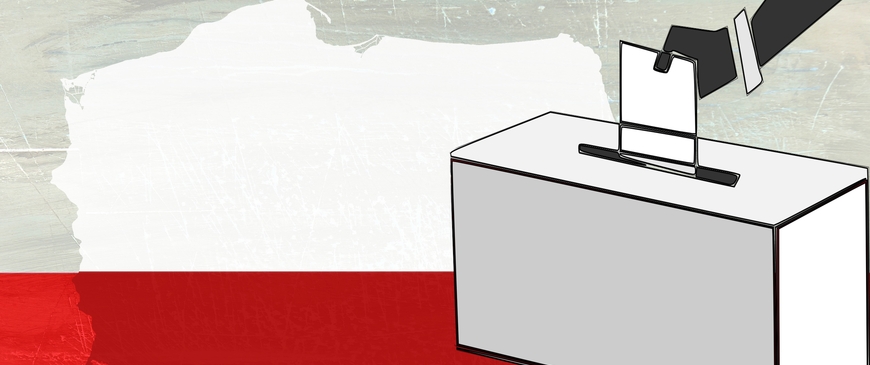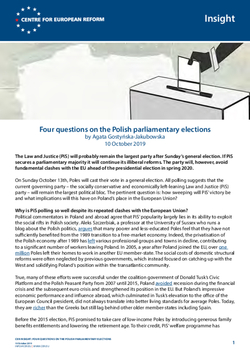
Four questions on the Polish parliamentary elections
The Polish Law and Justice party will probably remain the largest political block after Sunday’s general elections. If it secures a parliamentary majority it will carry on its illiberal reforms.
On Sunday October 13th, Poles will cast their vote in a general election. All polling suggests that the current governing party – the socially conservative and economically left-leaning Law and Justice (PiS) party – will remain the largest political bloc. The pertinent question is: how sweeping will PiS’ victory be and what implications will this have on Poland’s place in the European Union?
Why is PiS polling so well despite its repeated clashes with the European Union?
Political commentators in Poland and abroad agree that PiS’ popularity largely lies in its ability to exploit the social rifts in Polish society. Aleks Szczerbiak, a professor at the University of Sussex who runs a blog about the Polish politics, argues that many poorer and less-educated Poles feel that they have not sufficiently benefited from the 1989 transition to a free-market economy. Indeed, the privatisation of the Polish economy after 1989 has left various professional groups and towns in decline, contributing to a significant number of workers leaving Poland. In 2005, a year after Poland joined the EU, over one million Poles left their homes to work in another EU member-state. The social costs of domestic structural reforms were often neglected by previous governments, which instead focused on catching up with the West and solidifying Poland’s position within the transatlantic community.
True, many of these efforts were successful: under the coalition government of Donald Tusk’s Civic Platform and the Polish Peasant Party from 2007 until 2015, Poland avoided recession during the financial crisis and the subsequent euro crisis and strengthened its position in the EU. But Poland’s impressive economic performance and influence abroad, which culminated in Tusk’s elevation to the office of the European Council president, did not always translate into better living standards for average Poles. Today, they are richer than the Greeks but still lag behind other older member-states including Spain.
Before the 2015 election, PiS promised to take care of low-income Poles by introducing generous family benefits entitlements and lowering the retirement age. To their credit, PiS’ welfare programme has helped eliminate child poverty in Poland and improved the financial situation of some of low-income households. These voters believe that PiS has helped them to regain their dignity. The party is willing to further capitalise on these sentiments and is pledging to significantly raise the minimum wage from €520 to around €600 a month by 2020 and over €900 by 2023. This election campaign, Mateusz Morawiecki, the incumbent Polish prime minister, promised that PiS will ensure that Poland ceases to be a country of low incomes and cheap labour. The party has also presented itself as a defender of traditional values and targeted the LGBTQ community in Poland to attract more conservative voters. Opposition parties have, on the other hand, failed to come up with a coherent counter-narrative.
Indeed, the polls suggest that PiS could even secure over 45 per cent of the vote. These numbers would put PiS far ahead of its political opponents who failed to form a coherent opposition bloc. The Civic Coalition (a coalition of the centre-right Civic Platform, the liberal Modern Party, Greens and the progressive Polish Initiative) is polling between 25 per cent and 29 per cent; the Left (Social Democrats, Spring Party, and Left Together) is likely to secure around 13 per cent of the vote and the Polish Peasant Party together with the anti-establishment Kukiz party will probably score around 6 per cent. The far-right Confederation might also meet the election threshold of 5 per cent. PiS’ ability to secure a majority in the parliament will eventually depend on how many parties obtain parliamentary seats on Sunday. The failure of the Socialists and Democrats to enter the parliament contributed to PiS’ victory in 2015. Today, the bloc of left-wing parties is polling better than many expected.
Is PiS unsinkable?
Public support for PiS has remained steady despite clashes with the EU and various domestic scandals which have shown that the party’s own representatives have abused public office. For many PiS supporters, judicial reform is too remote to bother about; others might be willing to swallow PiS’ backtracking on the rule of law if this means greater welfare benefits. The public, which is very supportive of Poland’s membership in the EU, is also not buying into the narrative that democratic backsliding could lead to Poland’s marginalisation in the EU or – worse – to an exit from the EU. The Polish opposition used this argument in the European Parliament elections but it failed to convince voters: PiS won that vote.
If there is anything that could help to topple PiS, it is probably either the retirement of its leader Jarosław Kaczyński, who has governed the party with an iron fist, or an economic crisis. The party has no obvious successor and any internal squabbles over who should replace Kaczyński would weaken PiS’ standing. Germany is on the brink of a recession which would have implications for other Central European economies, including Poland. A worsening economic environment would probably force a government to limit its policy of social transfers to the poorest. This could affect public support for PiS and could pave the way for a change of guard in Poland. But the World Bank predicts that while Polish economic growth will indeed slow in 2020, it will still come in at a respectable 3.6 per cent. Therefore, economic concerns are unlikely to significantly influence Sunday’s electoral race.
What would another PiS victory mean for the future of liberal democracy in Poland?
If PiS wins a parliamentary majority in both houses of parliament, it would probably attempt to further undermine democratic checks and balances. For example, PiS wants to make it easier for the government to lift the immunity of judges. There is little doubt that such a reform would be designed to put pressure on defiant judges or to discipline them; just recently the PiS deputy justice minister engineered a smear campaign on social media against judges who had criticised the government. But the right to immunity is guaranteed by the Polish constitution and PiS would have to obtain two-thirds of all seats in the lower house (Sejm) and a majority in the upper house (Senat) to be able to change it. It is unlikely that PiS will secure such a large majority on Sunday. But after the party changed the act governing the Constitutional Tribunal (Court) and packed the court with friendly figures, PiS does not need a constitutional majority to further weaken democratic institutions. The new makeup of the court has made it easier for PiS to push through controversial and at times unconstitutional laws.
PiS might also want to target the media. It has already suggested that journalists, who require public trust, should be regulated in a similar way to lawyers. Across the EU, professional journalists are regulated only in Italy and Portugal. While PiS has remained vague on what exactly regulation would mean, one cannot exclude that the party will want to place conditions on who can become a journalist. Earlier this summer, the deputy prime minister also hinted that the government might want to “re-Polonise” the private media after the elections. Today, some Polish media outlets are owned by foreign companies (eg. Swiss-German Ringier Axel Springer, American Discovery Communications or French Vivendi). PiS and its allies have complained that these companies represent foreign interests in the domestic Polish discourse and suggested they might try to buy them out using funds from state banks and companies. Although PiS’ electoral programme is silent about media ‘re-Polonisation’, it is possible that PiS will try to push through legislation to that effect if it wins a majority.
PiS’ ability to carry out such illiberal reforms will depend on whether it is able to secure a majority on Sunday. PiS’ reforms could also be hampered if it loses its majority in the Senat, which approves acts adopted by the lower house. To maximise their chances, opposition parties have agreed not to run against each other in the Senat elections, meaning that in most cases there will be only one opposition candidate running against PiS.
What implications will the elections have on Poland’s place in the EU?
The PiS manifesto declares that it will consult the EU if it decides to push ahead with other (controversial) judicial reforms. But that does not mean that PiS will retract its planned changes. PiS hopes that Ursula von der Leyen, the Commission’s president-elect, will show greater leniency towards its backtracking on the rule of law than Jean-Claude Juncker, her predecessor. Her election was, in part, secured by PiS’ votes in the European Parliament and the party will expect her to return the favour. PiS might, however, try to avoid any fundamental clashes with the new EU leadership, at least in the first year of being in power. Poland will hold a presidential election in spring 2020 and PiS will hope to consolidate its hold on power. A confrontational approach towards the EU could put off moderate voters which PiS will try to lure in.
Poland’s falling star in the EU will have an impact on its bargaining power, particularly in the multiannual financial framework negotiations. The current Commission proposal for the EU’s long-term budget is less generous to Poland (Warsaw is set to receive around €20 billion less from the cohesion policy than it would under the current framework). With its reputation as a recalcitrant member-state, Poland will struggle to find the support among other member-states to increase this allocation. If the party fails to secure more funds, it might attempt to strengthen its eurosceptic narrative at home and accuse Brussels, France and Germany of singling out Warsaw for refusing to fall into line on issues such as migration or climate change. The party, however, will not openly advocate for Poland’s departure from the EU – at least not until Warsaw becomes a net payer into the EU budget. This is not an imminent reality – so for now, Poland’s star will reside alongside the other 27, soon to be 26.
Agata Gostyńska-Jakubowska is a senior research fellow at the Centre for European Reform.


Add new comment